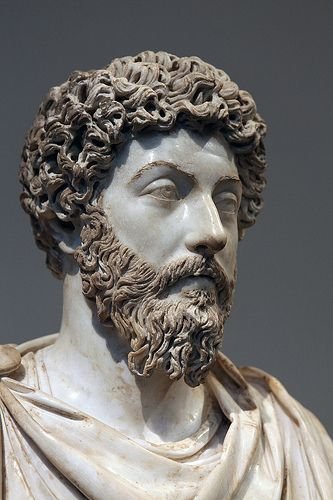
A Bell for Adano
Historical fiction is one of today’s most popular genres. From the Peloponnesian War to the war in Iraq and all points in between, you can read books that will give you a sense of what it was like to live in those times. Unsurprisingly, the most compelling of these works are created by the people who witnessed these momentous events, who were part of it. I think of such great novels as Hemmingway’s For Whom The Bell Tolls, Heller’s Catch-22, and Vonnegut’s Slaughterhouse Five. John Hersey’s Pulitzer Prize winning A Bell for Adano, although not ranked as highly as these others, deserves praise. There is an authenticity to it that gives the reader a sense of what life in Italy must have been like as the war ended.

Marcus Aurelius, Philosopher King?
Plato wrote of the philosopher king. He described a ruler who combined philosophical knowledge and temperament with political skill and power. Since that time, there has been only one ruler who embodied Plato’s description. Although Marcus Aurelius, in his humility, saw himself as merely a student of philosophy, he was the personification of this Platonic ideal.

Giuseppe Garibaldi, Hero of Two Worlds
As Joseph Campbell said, “a hero is someone who has given his or her life to something bigger than oneself.” I can think of no greater example of a hero than Giuseppe Garibaldi. He was a man who combined the personal magnetism of George Washington, the convictions of Abraham Lincoln, and the swashbuckling joie de vivre of Errol Flynn.

Pineapple on your pizza, sure. Anchovies, no.
You want pineapple on your pizza? Sure, you could get that anywhere. But try asking for anchovies! Nowadays, you get anything on your pizza, from barbeque chicken to kimchi. What is happening to pizza?

Tony Bennette
This past July, we bade farewell to Tony Bennett, one of the all-time great crooners. Tony Bennett, an artist of whom Frank Sinatra said “is the best singer in the business.”
The Iconic, Columbus

The Neapolitan Quartet
The Neapolitan Quartet is a set of novels to which many Americans have been introduced through the HBO series, My Brilliant Friend. While the television series does an excellent job of capturing the essence of the books and is well worth the watching, there is nothing that can compare to actually reading Elana Ferrante’s words. I devoured these books, not hesitating in going immediately from one to the next, as if each book were merely chapters of one complete work, which they were. Ferrante has described them as “a single novel” published in four volumes due to length and duration. They are like the Lord of the Rings Trilogy, one story across multiple books.

Canto 1: How Dark Was the Wood
In my January 27th post, Lost and Afraid in Dante’s Wood, I proposed that rather than interpreting the woods as Dante’s sinful life, we should see the forest as the fallen world in which Dante lived. In that article, I discussed how the dangers of the forest are metaphors for the spiritual threats we all face in life’s journey. This article explores the darkness of that wood.

Canto 1: Lost and Afraid in Dante’s Wood
This past May, I was fortunate enough to walk the Camino de Santiago. One morning, I headed out a couple of hours before dawn, hoping to reach my destination before the sun became too strong. There was no moon, so it was very dark. If there were any stars, I could not see them through the canopy formed by the trees. Although I had a headlamp, walking through an inky black forest was unnerving. I worried about what might be hiding in a clump of bushes farther up the path. Worse yet, what was behind me? I started to sing, hoping to frighten anything that might be nearby. Then I wondered, would I be scaring off potential predators or simply telling them where to find their breakfast? Although sitting in my comfortable, well-lit library, I can now laugh, I was more flustered than I care to admit.
The experience made real to me the confusion and fear Dante must have felt in Canto 1 of the Inferno. I, like Dante, was a pilgrim alone in a dark wood. Even as I say this, I feel the comparison is unfair to Signore Alighieri. Dante was lost and in the dark. He did not have a GPS to guide his steps or a rechargeable LED headlamp to light his path. Yet, even with these advantages, I was still apprehensive. It was not my best morning on the Camino.

Did Bambi Call his father on Father’s Day

Dante: Pilgrimage, Purgatory, and Instant Pudding
Today, May 9, 2022, I begin my pilgrimage in Saint Jean Pied de Port with the intent of walking the approximately 476 miles to Santiago. A pilgrimage. Me, the agnostic. What am I nuts? Over the past few weeks, I have been asking myself what on earth possessed me to make such a commitment.

Bambi’s Sicilian Mother

The Godfather, The Offer, and Disinformation

Easter, Holy Week, & Sorrento
Ukraine & Partisan Flowers
What Befana Can Teach Us
Is the Feast of Seven Fishes Italian

Canto 28: Dante & Facebook
It is easy to be pessimistic. A pessimist can always find something about which to complain. Looking at recent polling, roughly 63% of Americans think that the country is on the wrong track. For more than the past ten years, over 50% of Americans have felt this way. I should note a slight dip to 49% in May of this year, but the rate has gone back up since then. The cause of this negative outlook is the result of a pandemic more lethal than Covid. A virus whose carriers do so willingly, happily. Dante describes these people in the Inferno.